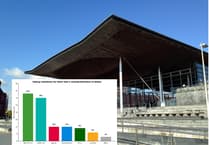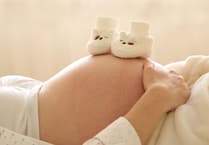Residents in rural Wales are likely to face higher council tax bills from 2025 under new Welsh Government proposals to make the system “fairer”, with a full revaluation of homes set to be undertaken.
Since the Covid-19 pandemic house prices in rural Wales have boomed, rising by an average of 29 per cent over the past five years.
The Welsh Government has launched a consultation into changes to the council tax system that could include extra bands and a revaluation of properties in a bid to make the system “fairer”, but opposition politicians have warned that with prices in rural Wales at their peak following the pandemic, the revaluation timing could “cause further harm” instead of easing the burden for struggling families.
The council tax system has remained untouched for the past 20 years, and the Institute for Fiscal Studies (IFS), in a report, said that the changes which could lead to higher tax bills in rural areas where house prices have risen is needed as the current system is “out of date and arbitrary.”
The IFS report said: “In broad terms, a revaluation would benefit areas and households whose properties had increased in value by less than average since 2003, at the expense of those whose property values had increased by more than average, as tax bills came to reflect current property values more accurately.
“Under a pure revaluation, average net council tax bills would increase in many rural areas (example by five per cent in Gwynedd): areas where property values have grown by more than average since 2003.
“Underlying these geographical patterns are varying impacts on individual households: in all parts of Wales under any potential reform, some would see their bills go up and some down.”
The report found that around 60 per cent of households would see their net bill fall or rise by less than £50 a year, with 20 per cent seeing a fall by more than £50 and 20 per cent seeing a rise by more than £50.
“Revaluation is unambiguously a good idea,” the IFS report said.
“It is absurd that we tax people based on 20-year-old property valuations and it is hard to see any principled objection to bringing valuations up to date.
“The Welsh Government should go ahead with revaluation and reform of council tax in 2025.”
Under a revaluation, the IFS report outlines, the number of properties in the lowest Band A would fall throughout mid and north Wales, while those in the highest two bands would be set to almost double.
Any revaluation change would increase the total amount of tax collected by Ceredigion, Gwynedd, Pembrokeshire and Powys councils by as much as 10 per cent.
The Welsh Government said: “A key goal in making the system fairer is that the changes do not seek to increase the overall amount of council tax raised, and any redesign should raise the same amount of council tax across Wales as the current system would.
“The current system is 20 years out of date, and it is unfair, with people living in homes in the lowest council tax bands paying a relatively higher amount of council tax in relation to the value of their homes, than people who live in higher value homes.”
“The consultation includes different potential approaches designed to make the tax fairer, including adding new council tax bands, changing the tax-rates charged for each band, and reviewing discounts and reductions.
“The consultation also asks about the pace of change people would like to see.
“The earliest date for any changes coming into effect is 1 April 2025.
“However, changes could be deferred until the next Senedd term, or introduced in stages.
“In parallel with this work, the Valuation Office Agency, is preparing to carry out a proposed revaluation of all 1.5 million homes in Wales to ensure valuations are up-to-date and in line with current property values.”
Under the plans, revaluations would happen every five years to “ensure people are paying the right amount of council tax in relation to the value of their property.”
“This also provides an opportunity every five years to keep looking at the tax bands and tax-rates, so we can keep making it fairer,” the Welsh Government added.
“While property prices have generally increased, this does not mean that council tax bills will automatically rise.
“Many people’s bills would stay the same after reforms and some would fall.”
Nearly half of households in Wales currently receive a discount or reduction on their council tax bill, including the 25 per cent single person discount.
Those reductions will remain in place, the Welsh Government said, despite IFS concerns that it encourages single occupants to live in bigger homes.
Ministers are also consulting on scrapping the 50 per cent empty property discount and changing the exemption for properties unoccupied since the former resident’s death.
Sam Rowlands, the Conservatives’ shadow local government minister, criticised plans for the revaluation saying it would a “tax hike for hard-working families.”
“Since 1999 council tax in Wales has gone up by nearly 200 per cent,” he said.
“The Labour Government, in the typical spirit of wanting to make taxation more ‘progressive’, is stealthily planning on hiking up council tax for hard-working people.
“The last time a revaluation took place in Wales one in three families were hit with higher bills – we can’t allow this to happen in the current cost-of-living challenge.
“It’s vitally important that any council tax revaluation is fair and justified and doesn’t hit hard working people across Wales.”
Mid and West Wales MS Jane Dodds, leader of the Liberal Democrats in Wales, said: “People across the country have seen their council tax increase over recent years, and as one of the most unfair taxes we have, change is long overdue.
“These plans from the Welsh Labour Government and Plaid Cymru come at a time when house prices are incredibly inflated.
“If the revaluation is done at the wrong time, plans designed to ease the burden on rate payers could cause further harm.
“We also can’t escape the fact that councils are under huge financial pressure too, and any impact on council funds could put more pressure on services and staff.
“It is also disappointing that the plans fall far short of the fundamental overhaul of the system we need.”
Minister for Finance and Local Government, Rebecca Evans, said: “We are asking people to help us shape the future of council tax in Wales.
“Achieving a fairer council tax will be one of the single most beneficial actions this government can take towards making Wales a more equal nation.
“The benefits will be felt in the pockets of many households.
“This is not about raising more money from taxes and changes are not going to happen overnight.
“We see this very much as being a gradual process and that is why we are also asking for views on the pace of change.”
The consultation is a part of the Co-operation Agreement commitment between the Welsh Government and Plaid Cymru.
Plaid Cymru Designated Member Cefin Campbell said: “It is widely recognised that council tax is outdated and long overdue for reform.
“This consultation is asking for the views of people across Wales on what a council tax could look like in the future and how we can make it fairer.
“While change is needed, it will take time meaning bills will not change immediately.
“We are consulting not only on what needs to change, but when the changes could come into place.”
The new scheme
▫ Council tax: Council tax is money you pay to your local council, and is based on the value of your home. It pays for services your local council provides, like bin collections, road maintenance, and running local schools. Around 20 per cent of council revenue spend is generated from council tax- but it varies between each local authority.
▫ The current system: The council tax bands we have now were last valued in 2003. The Welsh Government say this makes them 20 years out of date. England and Scotland- revalued their systems in 1991.
There are nine council tax bands in Wales A-I, that’s one more than England and Scotland who both only have eight. Local councils currently have the power to set Band D.
£2.4 billion is raised in council tax in Wales every year.
1.5 million households in Wales pay council tax, with around half of households already receiving some sort of reduced bill- like a student exemption, or single adult discount. Those reductions will remain in place, the Welsh Government said, despite IFS concerns that it encourages single occupants to live in bigger homes.
▫ Council tax: The Welsh Government is looking at three proposed approaches to council tax in the review. Theses are:
▫ Minimal reform: A revaluation of properties to check they are up-to-date but keeping the current nine bands and tax-rates. This would bring the current system up-to-date and result in a small move in the direction of fairness.
▫ Modest reform: A revaluation plus further reforms to the tax-rates charged for each band, to spread council tax more fairly. This means bills for households in lower band properties would fall, and bills for those in the highest band properties would rise. This would address both the outdatedness of the current system and also its unfair, regressive nature.
▫ Expanded reform: A revaluation plus further reforms including additional tax bands and changes to the tax-rates.
This approach would see the number of bands increase from nine to 12, adding one band at the bottom for the lowest value properties in Wales, and two more bands at the top, for the most expensive properties valued at over £1.2 million.
This would be a decisive move in the direction of fairness.
▫ Decision time: The consultation is open until the 6 February 2024. the Welsh Government will look at the results of this and announce the next steps around Easter.
▫ Other changes: Ministers are also consulting on scrapping the 50 per cent empty property discount and changing the exemption for properties unoccupied since the former resident’s death.
Have your say on the issues that matter to you: email [email protected] or phone 01970 615000




